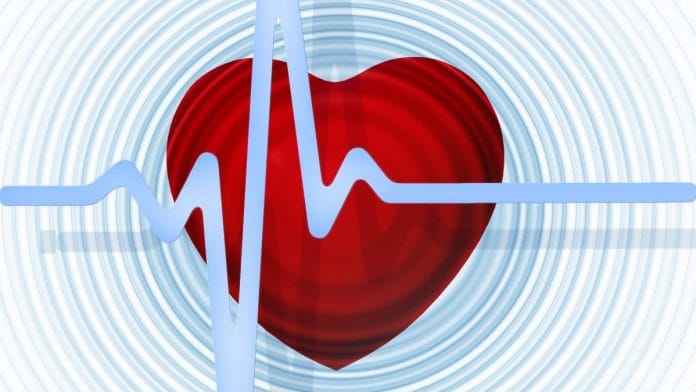New Delhi: The novel coronavirus (SARS-CoV-2) that causes Covid-19 has an ability to cut through the heart muscle in a way that is seen in no other disease, researchers have found.
Scientists at the Gladstone Institute in San Francisco, USA, introduced the virus in human heart cells grown in culture dishes, and found that the virus cleanly slices the muscle. Similar damage has also been found in heart muscles of patients who died of Covid-19 during autopsy.
In a pre-print paper in bioRxiv, the scientists have hypothesised that this could be the reason why 50 per cent Covid-19 patients end up with cardiac dysfunction.
“Determining the mechanisms responsible for diminished cardiac function is critically important to develop cardioprotective therapies for Covid-19. We observe that SARS-CoV-2 infection creates extremely precise and ordered disruptions to the myofibrillar structure and dissolution of the cardiac contractile machinery, which would inevitably lead to functional collapse,” the researchers wrote.
“The striking consistency and periodicity of fragmentation suggests specific protease activity responsible for separation of the sarcomeric thick and thin filaments, as shown by immunofluorescence and TEM (transmission electron microscopy),” they added.
The myofibrillar structure is the muscular structure of the heart, which is key to its ability to pump blood (contract and relax). Proteases are enzymes that break down proteins, while sarcomeres are the functional units of the muscle tissue.
Damage to the heart muscle, especially structural damage, can be difficult to heal because unlike any other muscle in the body, it cannot rest.
Also read: Covid found in heart muscle cells of deceased patients but no sign of cardiac distress — study
The study’s findings
It is now fairly well-established that while Covid-19 is primarily a disease that affects the lungs, it leaves lasting effects on almost all systems of the body.
On its scientists’ findings about its effects on the heart, Gladstone Institute said in a statement: “The team observed that when they exposed cardiomyocytes to SARS-CoV-2, the sarcomeres in some of the cells appeared to be diced into small, regularly sized fragments. Typically, sarcomeres — units of the muscle fibres in heart cells — are organised into long filaments aligned in the same direction. These sarcomeres control the coordinated contraction of heart cells to produce the normal heartbeat.”
Todd McDevitt, senior investigator on the study and professor of bioengineering and therapeutic sciences at University of California San Francisco added: “Early on in our experiments, we noticed that many of the cardiomyocytes were exhibiting some very strange features. What we were seeing was completely abnormal; in my years of looking at cardiomyocytes, I had never seen anything like it before.”
Moreover, in many of the heart cells, the researchers found that nuclear DNA is missing.
“The sarcomere disruptions we discovered would make it impossible for the heart muscle cells to beat properly… It (losing nuclear DNA) is the cell equivalent of being brain dead,” said Bruce Conklin, another investigator and a professor of medicine, cellular and molecular pharmacology, and ophthalmology at UCSF.
“Even after scouring scientific literature and conferring with colleagues, we cannot find these abnormal cell features in any other cardiac disease model. We believe they are unique to SARS-CoV-2 and could explain the prolonged heart damage seen in many Covid-19 patients.”
Matter of serious concern
The findings are a matter of serious concern, according to Dr K.S. Reddy, former professor of cardiology at AIIMS and president of the Public Health Foundation of India. The study could also explain the chronic fatigue that many Covid patients complain of post-recovery, he said.
“The observation that the SARS-CoV-2 virus can directly destroy the heart muscle fibres, apart from the effects of immunologically mediated myocarditis and thrombosis in coronary arteries causing heart attacks, is a matter of serious concern. It has an impact on chronic fatigue and disability resulting from the viral infection,” Reddy told ThePrint.
“The fact that even younger individuals with no previous history of heart disease can suffer cardiac damage is worrisome. The need to prevent the infection becomes even more important in light of these findings,” he said.
Also read: 1 in 7 college athletes had heart damage after Covid recovery, finds US study






